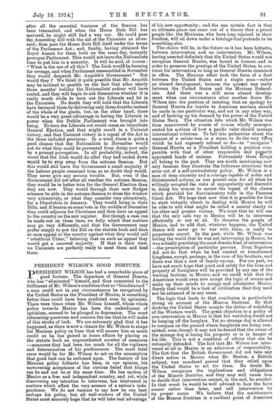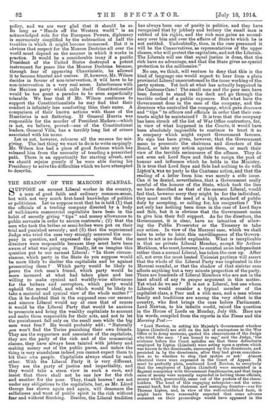PRESIDENT WILSON'S GOOD FORTUNE.
pRESIDENT WILSON has had a remarkable piece of good fortune. The departure of General Huerta, who has " eliminated " himself, and thus consented to the fulfilment of Mr. Wilson's condition that so "bloodstained " a man could not in any circumstances be recognized by the United States as the President of Mexico, is something better than could have been predicted even by optimists. There were times when Mr. Wilson himself, whose whole policy towards Mexico has been the embodiment of optimism, seemed to be plunged in depression. The most interesting questions now concern the use that he will make of this stroke of luck. We are extremely glad that it has happened, as there is now a chance for Mr. Wilson to shape his Mexican policy on lines that will ensure him as much credit as be has gained in home affairs by placing on the statute book an unprecedented number of measures —measures that had been too much for all the vigilance and determination of his predecessors. The most fatal error would be for Mr. Wilson to act on the assumption that good luck can be reckoned upon. The feature of his Mexican policy hitherto has been, in our opinion, his unwavering acceptance of the curious belief that things can be and not be at the same time. He has spoken of Mexico as a free and independent country, and yet, while disavowing any intention to intervene, has intervened in matters which affect the very essence of a nation's inde- pendence. We do not venture to say how he can best reshape his policy, but all well-wishers of the United States must sincerely hope that he will take Teal advantage of his new opportunity ; and the one certain fact is that no ultimate peace can come out of a theory that a proud people like the Mexicans, who have long rejoiced in their freedom, will sit down under a tutelage that pretends to be something else.
The choice will be, in the future as it has been hitherto, between intervention and no intervention. Mr. Wilson, having asserted definitely that the United States would not recognize General Huerta, was bound in honour, and in order to preserve the prestige of the United States, to con- tinue his intervention so long as General Huerta remained in office. The Mexican affair took the form of a duel between the United States and a single man—rather an absurd development, because the quarrel was really between the United States and the Mexican Federal- ists. And there was a still more absurd develop- ment when one circumstance after another drove Mr. Wilson into the position of insisting that an apology by General Huerta for insults to American marines should be made in one particular way, and not in any other way, and of backing up his demand by the power of the United States Navy. The situation into which Mr. Wilson was then manoeuvred by events of course wholly misrepre- sented his notions of how a pacific ruler should manage international relations. To fall into pedantries about the manner of a salute was, in a sense, to do the very tin; which he had expressly refused to do—to " recognize" General Huerta as a President holding a position com- parable with that of other responsible and prgperly appointed heads of nations. Fortunately these things all belong to the past. They are worth mentioning now only because they illustrate the ludicrous situations that arise out of a self-contradictory policy. Mr. Wilson is a man of deep sincerity and a courage capable of noble and disinterested actions, as was proved once for all when he willingly accepted the risks of unpopularity and discredit in doing his utmost to secure the repeal of the clause which provided for discriminatory tolls in the Panama Canal Act. We hope that now that it is possible for him to start virtually afresh in dealing with Mexico he will be able to add what might be called a mental clarity to his other and greater virtues. We trust that he will see that the only safe way in Mexico will be to intervene effectually or not at all. To threaten the people of Mexico, and to add that, whatever happens, the United States will never go to war with them, is really to perpetuate unrest. In the past, while Mr. Wilson was telling the world that he was not intervening in Mexico, he was actually practising the most drastic kind of intervention —the proscription of particular persons. Even Napoleon did not do that when be had created or transformed kingdoms, except., perhaps, in the case of his brothers, and there was then a sort of family excuse. For our part, we have not much hope that quiet and safety for the lives and property of foreigners will be provided by any one of the warring factions in Mexico, and we could wish that the Americans would even now accept the logic of events and make up their minds to occupy and administer Mexico. Surely that would be a task of civilization that they need not be ashamed of in any sense.
The logic that leads to that conclusion is particularly strong on account of the Monroe Doctrine. By that doctrine the United States accepts the duties of watchdog of the Western world. The great objection to a policy of non-intervention in Mexico is that the watchdog would not be keeping off the burglars. Yet no strange dog is allowed to trespass on the ground where burglaries are being com- mitted, even though it may not be denied that the owner of the strange dog is losing his property or is in danger of his life. This is not a condition of affairs that can be rationally defended. The fact that Mr. Wilson has inter- vened at all in Mexico is an admission of responsibility.
The fact that the British Government did not take any direct action in Mexico when Mr. Benton, a British subject, was murdered proved that they relied upon the United States to act for them. No doubt Mr. Wilson recognizes the implications and obligations of the Monroe Doctrine, and they may well cause him to decide that intervention cannot, in the end, be avoided. In that event be would be well advised to face the facts sooner rather than later, and call intervention by its proper name. We believe that the maintenance of the Monroe Doctrine is a cardinal point of American policy, and we are very glad that it should be so. So long as "Hands off the Western world" is an acknowledged rule for the European Powers, diplomacy is enormously simplified by the subtraction of half the troubles in which it might become immersed. But it is obvious that respect for the Monroe Doctrine all over the world must depend on the manner in which it works in practice. It would be a considerable irony if a pacific President of the United States destroyed a potent instrument for peace like the Monroe Doctrine because, through fear of appearing Chauvinistic, he allowed it to become blunted and useless. If, however, Mr. Wilson decides in favour of non-intervention, it will have to be non-intervention in a very real sense. Interference with the Mexican party which calls itself Constitutionalist would be too great a paradox to be even superficially tolerable. We fear that if Mr. Wilson continues to support the Constitutionalists he may find that their conduct is infinitely less comforting than their name. A comparison of their known actions with those of the Huertistas is not flattering. If General Huerta was responsible for the murder of President Madero—which is not, we believe, proved—one of the Constitutional leaders, General Villa, has a terribly long list of crimes associated with his name.
Let us not, however, rehearse all the reasons for mis- giving. The last thing we want to do is to write carpingly. Mr. Wilson has had a piece of good fortune which has released him from the necessity of treading a prescribed path. There is an opportunity for starting afresh, and we should rejoice greatly if he were able during his Presidency to solve the difficulties which we have attempted to describe.











































 Previous page
Previous page